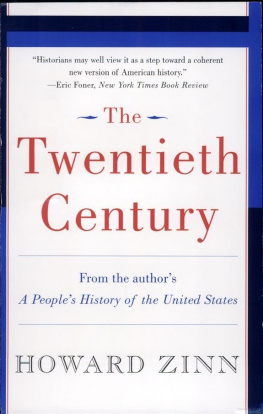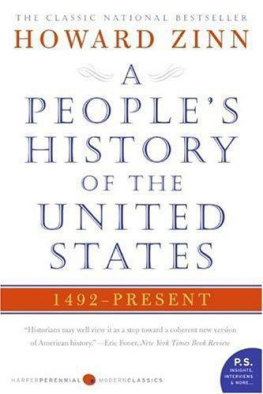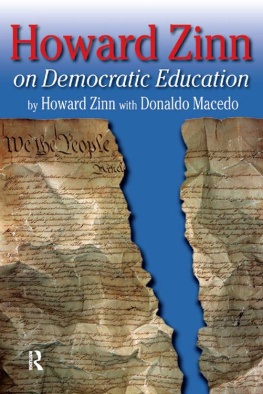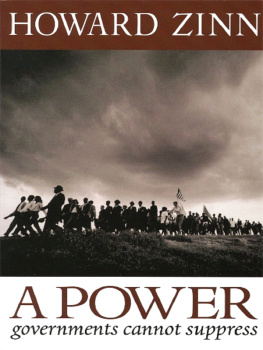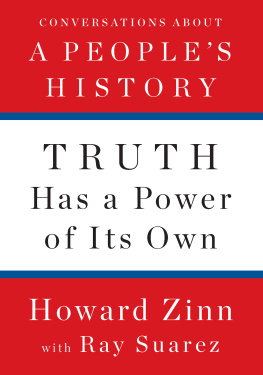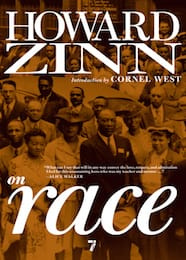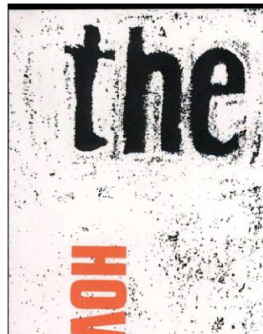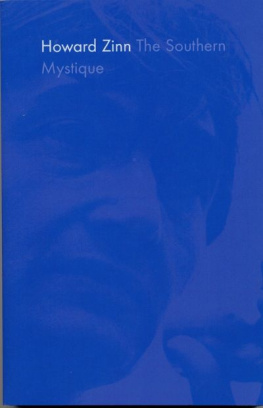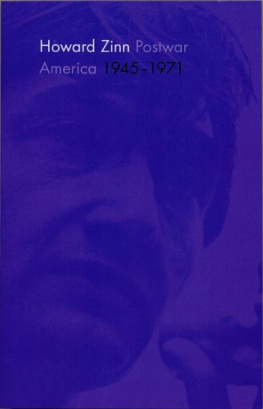Howard Zinn - Howard Zinn on War
Here you can read online Howard Zinn - Howard Zinn on War full text of the book (entire story) in english for free. Download pdf and epub, get meaning, cover and reviews about this ebook. year: 2011, publisher: Seven Stories Press, genre: Politics. Description of the work, (preface) as well as reviews are available. Best literature library LitArk.com created for fans of good reading and offers a wide selection of genres:
Romance novel
Science fiction
Adventure
Detective
Science
History
Home and family
Prose
Art
Politics
Computer
Non-fiction
Religion
Business
Children
Humor
Choose a favorite category and find really read worthwhile books. Enjoy immersion in the world of imagination, feel the emotions of the characters or learn something new for yourself, make an fascinating discovery.

- Book:Howard Zinn on War
- Author:
- Publisher:Seven Stories Press
- Genre:
- Year:2011
- Rating:5 / 5
- Favourites:Add to favourites
- Your mark:
- 100
- 1
- 2
- 3
- 4
- 5
Howard Zinn on War: summary, description and annotation
We offer to read an annotation, description, summary or preface (depends on what the author of the book "Howard Zinn on War" wrote himself). If you haven't found the necessary information about the book — write in the comments, we will try to find it.
Howard Zinn on War — read online for free the complete book (whole text) full work
Below is the text of the book, divided by pages. System saving the place of the last page read, allows you to conveniently read the book "Howard Zinn on War" online for free, without having to search again every time where you left off. Put a bookmark, and you can go to the page where you finished reading at any time.
Font size:
Interval:
Bookmark:
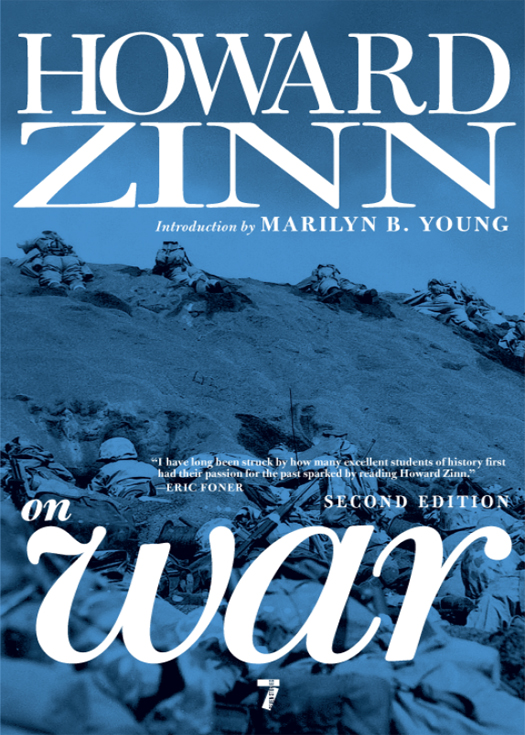
This eBook is licensed to Kai Maggard, maggardkai@icloud.com on 06/14/2019
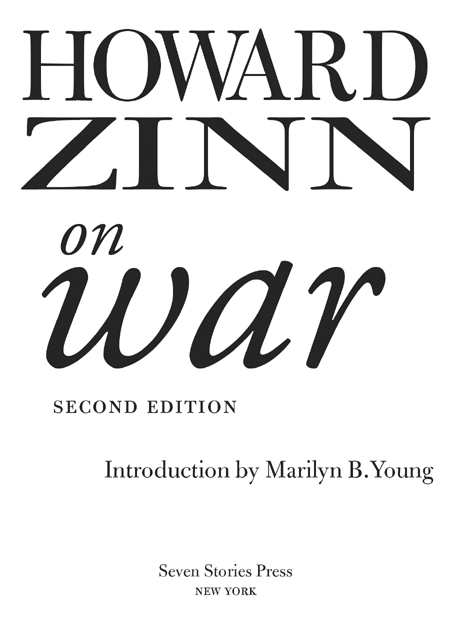
This eBook is licensed to Kai Maggard, maggardkai@icloud.com on 06/14/2019
Copyright 1962, 1967, 1970, 1975, 1976, 1985, 1990, 1991, 1993, 1998, 1999, 2001, 2002, 2004, 2006, 2011 by Howard Zinn
Introduction 2011 by Marilyn B. Young
Most of the material in this book also appears in The Zinn Reader (Seven Stories Press, 1997) and The Zinn Reader, 2nd ed. (Seven Stories Press, 2009).
All rights reserved. No part of this book may be reproduced, stored in a retrieval system, or transmitted in any form, by any means, including mechanical, electronic, photocopying, recording or otherwise, without the prior written permission of the publisher.
Seven Stories Press
140 Watts Street
New York, NY 10013
www.sevenstories.com
Library of Congress Cataloging-in-Publication Data
Zinn, Howard, 1922-2010.
Howard Zinn on war / Howard Zinn ; foreword by Marilyn B. Young. -- 2nd ed.
p. cm.
eISBN: 978-1-60980-235-6
I. United StatesHistory, Military--20th century. 2. United States--Foreign relations20th century. 3. War on Terrorism, 2001-2009. 4. War--Moral and ethical aspects. 5. War and society--United States. 6. Zinn, Howard, 1922-2010--Political and social views. I. Title.
E745.Z56 2011
172.42--dc22
2011016364
College professors may order examination copies of Seven Stories Press titles for a free six-month trial period. To order, visit www.sevenstories.com/textbook, or fax on school letterhead to (212) 226-1411.
v3.1
This eBook is licensed to Kai Maggard, maggardkai@icloud.com on 06/14/2019
Incident (1975)
Means and Ends (1991)
This eBook is licensed to Kai Maggard, maggardkai@icloud.com on 06/14/2019
T o be hopeful in bad times, Howard Zinn wrote, is not just foolishly romantic. It is based on the fact that human history is a history not only of cruelty, but also of compassion, sacrifice, courage, kindness. Remembering the times when people have behaved magnificently gives us the energy to act, and at least the possibility of sending this spinning top of a world in a different direction. All these past weeks of uprisings in Tunisia, Egypt, Bahrain, Libya, and Madison, Wisconsin, I have thought of Howie and how he would have welcomed this evidence of the power of people to act directly, to change the very direction of the world. See, he might have said in one of the long phone calls in which we occasionally indulged, I was right, and together we would have taken pleasure in the unpredictability of history and the magnificence of people acting together, with compassion, sacrifice, courage, and kindness.
Throughout his life, Howard Zinn combined scholarship with activism, the one feeding the other and together inspiring his students, and beyond them all those who have heard him speak at innumerable rallies and protests. This is a collection of his speeches, editorials, and essays on war. It is also a collection of speeches, editorials, and essays on how war can be resisted, nonviolently. He wrote in the same voice in which he spoke; reading him you can hear his New York cadencesby turns tough and gentle and always on the edge of a joke. The history Zinn wrote, whether about war or the fight for social, economic, and political justice, told the story of ordinary people and their capacity for collective action for social change. In his writing, as in his speeches, that capacity is redemptive, outweighing the veniality and brutality of governments and their minions. Howard Zinn did not predict the wave of nonviolent democratic revolutions in the Middle East but they would not have surprised him.
Zinn wrote and spoke with passion and anger, leavened always by humor. Laughter was not only possible, but was necessary, and as you will see as you read, it comes along suddenly, unexpectedly. Thus, in a speech commemorating the Boston Massacre, Zinn reminds the audience of all the unremembered, uncommemorated massacres that have marked American history. Looking back at our Puritan ancestors, he says, and then pauseswell, I am stretching my ancestry a little. In the same talk he quoted Cotton Mather, who wrote that in the Pequot Massacre of 1636, no less than 600 Pequot souls were brought down to hell that day. And then an aside that makes us smile but also drives the point home: Mather was an expert on the destination of souls.
Most antiwar activists draw a firm line between the wars the US fought after 1945 and the one good war, World War II. Zinn, as a veteran of that war, struggled with the question and reached a different conclusion. Yes, he wrote, getting rid of fascism was a good cause. But does that make it a good war? He answers his own question at length in the essay Just and Unjust War, and it is at the heart of his teaching on war. You may well have a good cause, but there is no such thing as a good war.
There are, however, good ways to resist wars and Howard Zinn wrote about most of them. Dow Shalt Not Kill, for example, is a discussion of civil disobedience as one among many ways to oppose the war in Vietnam; Whom Will We Honor on Memorial Day? is an appeal to remember the veterans of old wars by refusing to sanction new ones; Their Atrocities and Ours shifts the ground for a discussion of the bombing of Kosovo. Among the most impressive essays is A Speech for LBJ, written in 1967. In it, perfectly capturing the intonation and rhythm of the Presidents Southern drawl, Zinn generously offered Lyndon Baines Johnson a way out of Vietnam. The Cleveland Plain Dealer ran the speech alongside an appeal by Senator Mendel Rivers of South Carolina to keep fighting, and another by Senator William Fulbright of Arkansas calling for gradual withdrawal, and then asked its readers to vote their preference63 percent voted for the Zinn/LBJ plan for an immediate end to the war and the withdrawal of all US troops.
As is clear from the first essay in this collection, Zinns meditative piece on the Force of Nonviolence, he was not an absolutist pacifist, nor did he outline rules for when some degree of violence might be necessary to achieve a greater good. Our values, he wrote in 1962, are multiple; they sometimes clash; and we need to weigh, weigh, weigh. Nor did he list rules for nonviolent action, though he did describe their central attributes: humor, kindness, pressure, flexibility, attack and retreatguerrilla warfare in time of peace. The hope nonviolence held out was simple. Man is open to suggestion. And nonviolence uses neither compulsion nor silence. Calmly, powerfully, it suggests. That, indeed, is what this book offers.
Marilyn B. Young
New York City, February 2011
This eBook is licensed to Kai Maggard, maggardkai@icloud.com on 06/14/2019
This article, written for the March 17, 1962, issue of The Nation, locates the reader just six months before the start of the Cuban Missile Crisis and at the heart of the Civil Rights Movement. Howard Zinn seizes this moment of historical importance to defend and explain the merit and force of nonviolence. He considers nonproliferation and nonviolent protest to be the peoples best options, evenor especiallywhen threatened with aggression. Howard maintained this principled stance of nonviolence until his last day. Eds
Font size:
Interval:
Bookmark:
Similar books «Howard Zinn on War»
Look at similar books to Howard Zinn on War. We have selected literature similar in name and meaning in the hope of providing readers with more options to find new, interesting, not yet read works.
Discussion, reviews of the book Howard Zinn on War and just readers' own opinions. Leave your comments, write what you think about the work, its meaning or the main characters. Specify what exactly you liked and what you didn't like, and why you think so.

